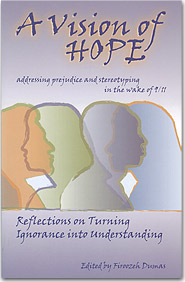Berkeleyan
I-House offers free copies of post-9/11 anthology
![]()
| 01 November 2006
When writer and International House alumna Firoozeh Dumas first came to the U.S. from Iran in 1972, her family was greeted with hospitality and generosity by Americans they encountered. All that changed suddenly, she recalls, when a group of Americans were taken hostage in Tehran on Nov. 4, 1979. "Overnight, bumper stickers and t-shirts declaring 'Iranians: Go Home!' and 'We Play Cowboys and Iranians' appeared everywhere."
 |
In A Vision of Hope - a slim new book edited by Dumas and published by I-House - 10 essayists describe similar instances of prejudice and hatred, this time in the wake of 9/11, and how they chose to react so as to "turn ignorance into understanding."
In the book, subtitled Addressing Prejudice and Stereotyping in the Wake of 9/11, I-House resident Aurelio Perez writes of his youth in the Midwest, where "There are no burning crosses. No threats are made to my family." Instead, he says, "[M]y peers teach me everything that a young boy in America's Heartland needs to know. I learn to dislike Chinks and gooks and I learn that if it's not them, it's the faggots. I learn to shift from one collection of racial slurs, one set of stereotypical expectation, and one trope-bound way of seeing the world to another with the same ease of a bilingual child seamlessly shifting mother tongues. I learn to fit in by hating the same people." Perez is one of four I-House residents and alumni included in the volume.
An anonymous African doctor, in another entry, describes a deadly attack, in the aftermath of 9/11, in northern Nigeria, where Christian and Muslim residents have a long history of bitter relations. In the title story, a Sikh from the San Joaquin Valley, Mansheel Singh, describes the taunting and hatred he endured as a sophomore in high school following the terrorist attacks of 9/11 - and the strengthening of his Sikh identity as a consequence. He was not alone in his ordeal. To deal with a rise in hate crimes against people wearing the Sikh turban, he writes, "Sikhs across the country were quick to do everything in their power to show their solidarity with America. Sikh-owned taxi cabs and gas stations were decorated with U.S. flags. Some Sikhs went so far as to wear red, white, and blue turbans."
Dumas is the author of Funny in Farsi: Growing Up Iranian in America, a collection of humorous and revealing vignettes based on her family's experiences in the United States. The essays included in her new anthology were selected by a jury from among 34 entries submitted by natives of Asia, Europe, Africa, and the United States. A $77,000 grant from Chevron Corporation paid for the winning authors' honoraria, publication of 10,000 copies, and distribution worldwide.
One thousand copies have been reserved for free distribution to Berkeley faculty, staff, and students. To request a copy, contact the I-House Program Office (ihprogra@berkeley.edu); include your full name and campus or home address.

